Home > Articles > Special Series > Bill Emerson — The Final Years
Bill Emerson — The Final Years
Although Bill Emerson decided to stop performing on stage in 2016—after a career that lasted over sixty years—he was not done recording in the studio. In 2015, Bill had contributed to Epilogue: A Tribute to John Duffey (produced by Akira Otsuka and Ronnie Freeland) by performing on the cut of “If I Were A Carpenter.” In 2017 he helped out his old bandmate Jimmy Gaudreau on his recording with Lauren “Elle” Mears by playing banjo on one cut on their album Give Us Strength. In 2018 and 2019 Bill worked on a project titled Emerson 414 with his son Billy Emerson (William Hundley Emerson III).
Emerson 414
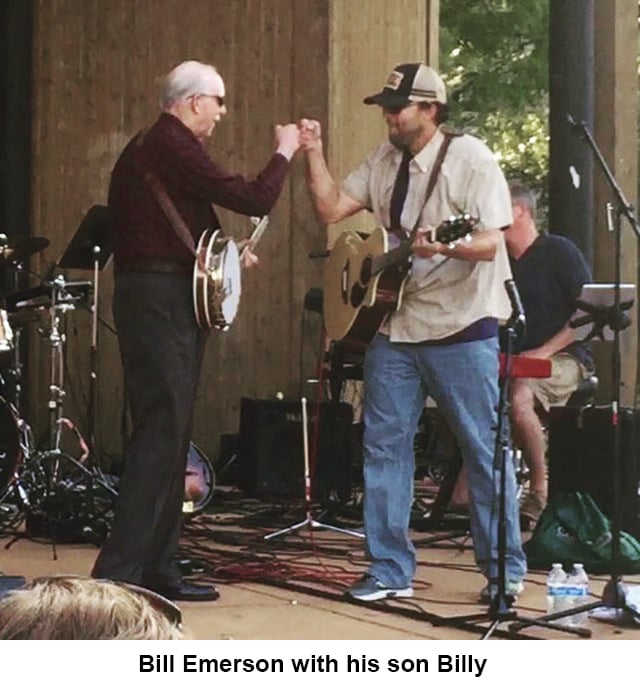
The title of Emerson 414 was inspired by the house number of Emerson’s long-time family home. The liner notes to the release, written by Bill’s son Mike, tells the story as follows: “414 has been the house number of the Emerson family home since the spring of 1967. From the formation of Emerson and Waldron, to a rehearsal space for what has been called the second classic lineup of The Country Gentlemen, to recording sessions, jam sessions, and visits from dozens of bluegrass stars; it is impossible to tell all the stories of the incredible music that has been played there! The occurrences at 414 are historical and treasured including the fact that Bill’s youngest son, Billy, is following in his footsteps as a performer. Following a brief career as a minor league baseball player (now a head coach and athletic director at Paul VI High School), Billy rejoined the musical life he grew up around and began performing about ten years ago. His hybrid “Rockgrass” band NRJ has regularly sold-out local music venues over the past five years, and he’s now testing the waters as a Bluegrass/Americana recording artist.”
Billy Emerson
When Billy Emerson was about ten years old, his father gave him a Yamaha acoustic guitar and taught him how to play a few chords. Billy said, “Music was around the house all of the time, but Dad never pushed any of us in that direction. He let us decide what we wanted to do and then he got into that with us. I messed around with the guitar a little from sixth grade through high school, but I was more into sports…mainly baseball. Mom and Dad were very supportive of that.”
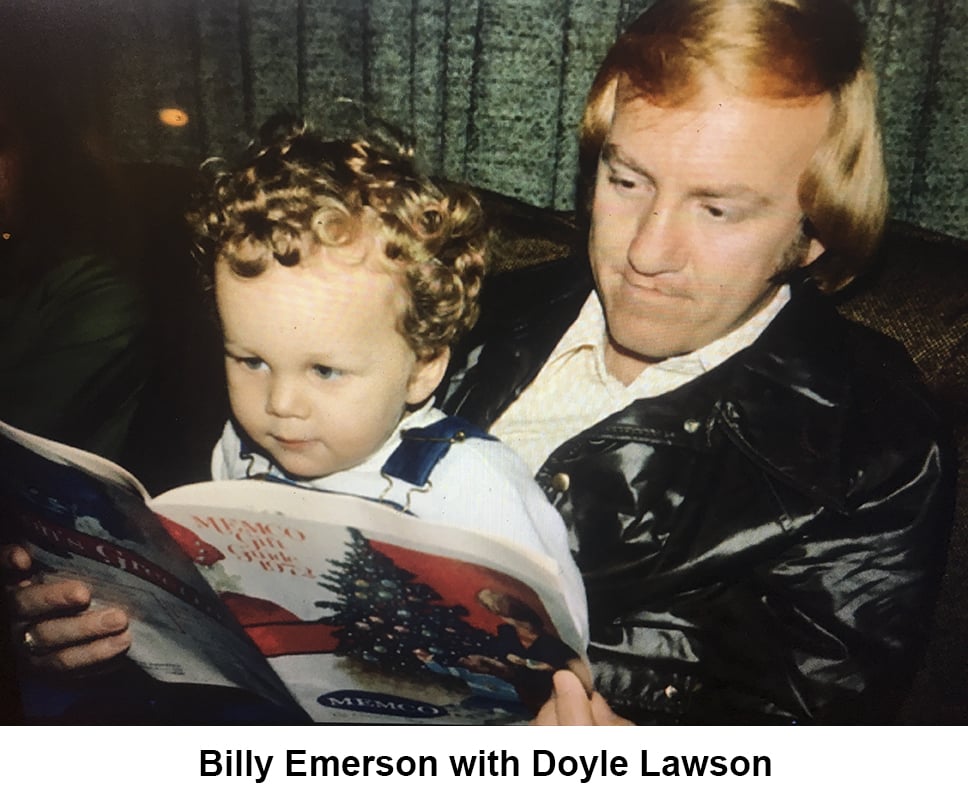
Billy added that now he wishes his father had pushed him a little more into music. He said, “I had the one of the greatest banjo teachers in the world right there in my house! I decided to focus on baseball in high school, through college and then in the minor leagues, but I kept playing the guitar and never lost what he taught me. I think my singing and rhythm guitar playing were natural by-products of being his son. I remember times when we’d be riding in the car and I’d listen to Dad sing harmony to the songs on the radio.”
Billy says that several “impactful moments” that he remembers from his childhood included whenever his father was playing with Country Current for one of the U.S. Presidents. He said, “I was only seven years old when he was playing a private party for Jimmy Carter. I thought that was the coolest thing in the world.” In his teen years, Billy remembers being in the studio when his father was recording the Reunion album. He said, “I think Reunion is a wildly under-rated album. I was in the studio when Dad was recording with Jimmy Martin, Charlie Waller, Tony Rice, and Red Allen. At the time I did not realize the magnitude of what I was witnessing. I was exposed to a lot of stuff…people like Pete Gobel, Ricky Skaggs, and Tony Rice coming by the house. I have a picture when I was one or two years old and sitting in Doyle Lawson’s lap.”
Billy did not start working with his father musically until around 2014. He explained that a group of guys who lived in his neighborhood were forming a band. They had heard Billy sing and knew he played rhythm guitar, so they asked him to join the group. The band was a six-piece classic rock cover group. He said, “We called what we did ‘rockgrass’ because we had a fiddle player in the band who could also play mandolin and I could play acoustic guitar, banjo and mandolin. We also had a drummer, electric bass, electric guitar, and keyboards. We would perform songs like Aerosmith’s ‘Sweet Emotion,’ or Cream’s ‘White Room’ and the fiddle player would play the guitar solos on his fiddle and I would play some mandolin or banjo. We played acoustic instruments, but we plugged them in.”
Billy’s band, NRJ, started to gain a following and were selling out local venues. Occasionally, Bill Emerson would bring his banjo out and perform with the band. Billy said, “Dad would come out and play a banjo part on an Eagles song and stuff like that.” Bill performing with Billy’s band led to Billy sitting in with Bill’s band Sweet Dixie when the guitar player couldn’t make a gig. Billy said, “Sometimes when the full band was there, I would get called up to sing a song or two…stuff like ‘Big Spike Hammer,’ or John Prine’s ‘Paradise.’”
These occasional collaborations led to Bill and Billy working together on the Emerson 414 EP. Billy said, “That was Dad’s idea. He said, ‘I want to record something with you. Pick out some stuff that you like that will translate to bluegrass.’ I brought songs to him and he gave them his stamp of approval. Then he said, ‘You take this and run with it. If you do something wrong, I’ll let you know.’” Billy called on Bill’s Sweet Dixie bandmates to help.
Joining Bill (banjo) and Billy Emerson (guitar and lead vocal) on Emerson 414 are Bill’s Sweet Dixie bandmates Wayne Lanham (mandolin and fiddle), Tom Adams (guitar), and Teri Chism (bass). Teri and Wayne also added harmony vocals. The band cut four songs for the EP as follows: “Tear Stained Eye” (a Sun Volt cover), “Leaving California” (a tune recorded by The Brakemen, a Canadian roots music group), “A Face In The Crowd” (Tom Petty), and “Stolen Car” (Bruce Springsteen). Bill Emerson’s long-time friend and engineer, George Hodgkiss recorded the tracks.
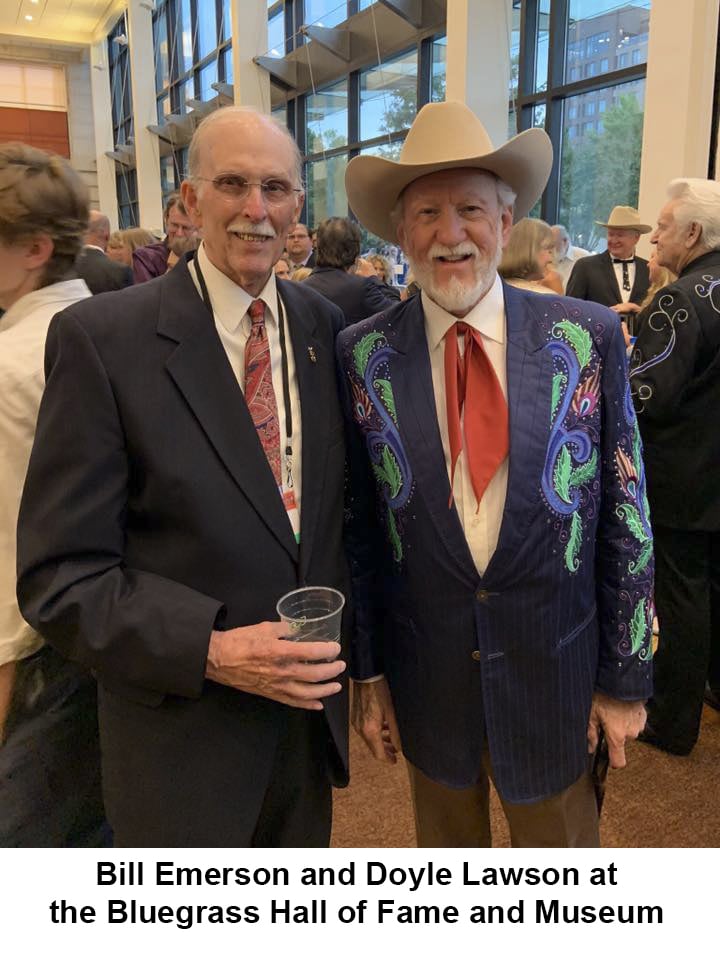
After the four-track EP was recorded, Bill gave Billy a list of radio stations and he went to work calling and emailing DJs and sending them CDs. Billy said, “People played the tracks and Sammy Passamano III of 615 Hideaway Records heard it. He contacted me and said, ‘Why don’t you record with us?’” Bill Emerson and Sweet Dixie had put out a number of recordings with Sammy Passamano Jr.’s Rural Rhythm Records.
With the support of 615 Hideaway Records, the band went back into the studio and recorded a cover of The Band’s “Ophelia” (written by Robbie Robertson). The same group who had recorded for the EP was on the “Ophelia” cut, plus Shelby Gold on fiddle. Billy said, “I was a fan of The Band and Levon Helm and it was an up-beat, fun song.” The song, recorded in February 2020, ended up reaching number one on XM radio for one month.
The plan was to go back in the studio and record enough songs to add to the four songs recorded for the EP, plus the single “Ophelia,” and produce a full album. Then COVID hit. Billy said, “We were going to do a few more singles and then put out a full album. My Dad was fired up to do more, but COVID shut us down and his health started going in and out. We had songs ready to go, but we never got the chance to record them.” Bill Emerson passed away on August 21st, 2021.
In retrospect, Billy said, “It was an unbelievable and amazing experience to do those recordings with him. I wouldn’t trade that time for anything in the world.”
Bill Emerson in the IBMA Hall of Fame
When Billy Emerson and his father started working together Billy set up Bill with a presence on social media. There is a Bill Emerson musician/band page on Facebook and a Bill Emerson Tribute Group. There was even a “Put Bill Emerson in the IBMA Hall of Fame” group. Billy said, “I think coming out with the social media and him continuing to record may have helped him be selected to the IBMA Hall of Fame. I don’t know. I just kept thinking, ‘How is this guy not in the Hall of Fame?’” The IBMA organization gave Bill Emerson a Distinguished Achievement Award in 2016 and then Bill was inducted into the IBMA Hall of Fame in 2019.
Billy said, “Dad never chased anything like that. He wasn’t a self-promoter and he didn’t seek the spotlight. He was humble. He liked to help others find their way. I came in to be his promoter. When he found out that he was going to be inducted, he sent me an email and all that it said was, ‘I found out today that I’m going to be in the Hall of Fame.’ That was it. I called him immediately.”
Billy continued, “I think Dad was a prominent figure in the history and development of the music. Even though he was traditional, he always said, ‘Real musicians appreciate all different kinds of music.’ He was a great song scout and talent scout. Tom Gray told me that when Dad brought ‘Fox On The Run’ into the band with Cliff Waldron, Tom told him ‘This song will never work in bluegrass.’ Dad saw that it would work.”
Bill Emerson’s Legacy
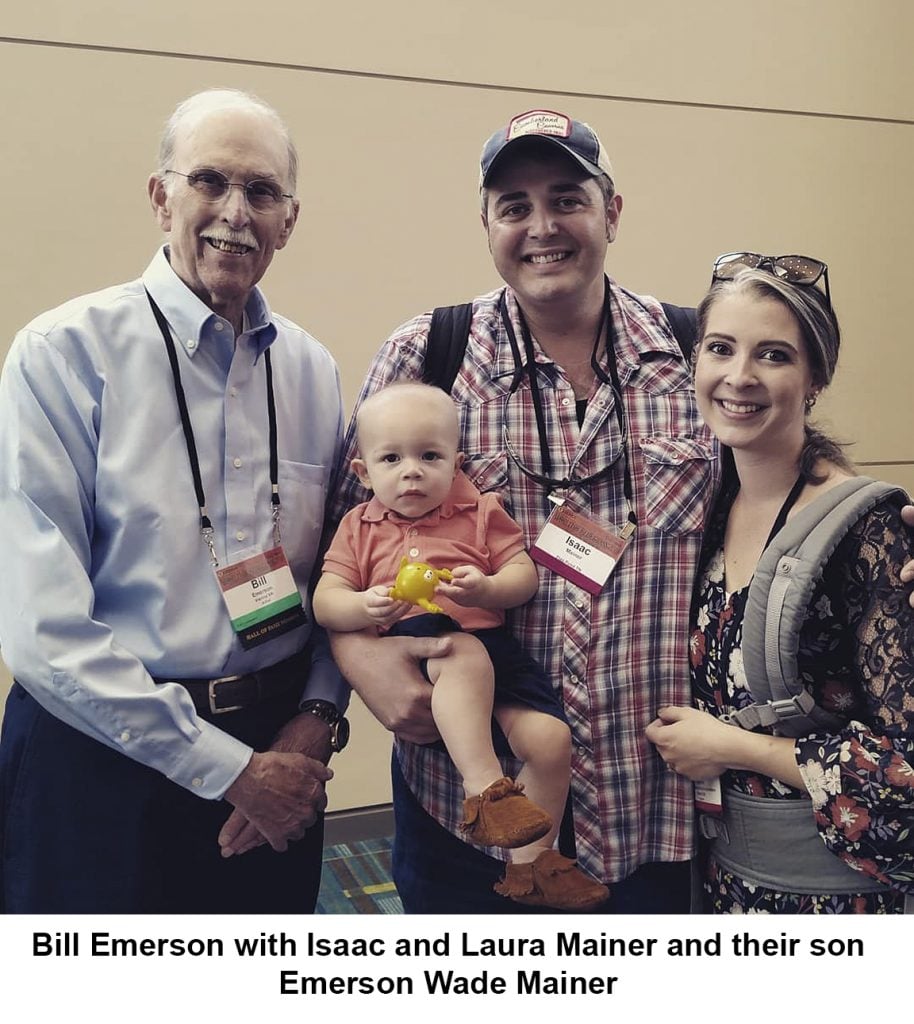
Although Bill Emerson was a traditional banjo player, he appreciated the various directions that others have taken bluegrass music. Billy Emerson said, “I’m a Billy Strings fan and I would show my dad Billy Strings videos because his band plays Dad’s tune ‘Home of the Red Fox.’ There are a lot of bluegrass people that are anti-Billy Strings, but Dad said, ‘That guy is good. He is something else! He reminds me of Tony.’ I think Billy Strings takes traditional bluegrass and crushes it. I went to a Billy Strings show in a sold-out 6000 seat venue in D.C. and he opened with ‘White House Blues’ and 6000 people went nuts. They played ‘Old Home Place,’ and ‘Good Woman’s Love’ and when they played ‘Home of the Red Fox’ Billy announced, ‘This one is by the late, great Bill Emerson.’” Over the past year and a half, many other bands have paid Bill the same honor, keeping his music and memory alive.
Laura Mainer and her husband Isaac are also keeping Bill Emerson’s name alive. The couple has a three-year-old son named Emerson Wade Mainer. The Emerson part honors Bill Emerson, the Wade part honors Isaac’s great-grand uncle Wade Mainer. Isaac, a banjo player, is the great-grand son of J.E. Mainer. J.E.(fiddle) and Wade (banjo) famously performed with the band J.E. Mainer and his Crazy Mountaineers starting in 1933 and running through the start of World War II.
When asked why they named their son Emerson, Laura explained that both her and her husband were students at ETSU when they met. She was playing the mandolin and he the banjo. She had yet to meet Isaac when he called her to see if she could fill in on mandolin with his band. He picked her up to go to the gig and the CD player in his vehicle was spinning a Country Gentlemen recording from the Bill Emerson, Doyle Lawson era. She said that she loved that band and after she found out that Isaac loved them too, an attraction grew. The couple met on the 17th of October in 2009 and were married exactly five years later on the 17th of October in 2014.
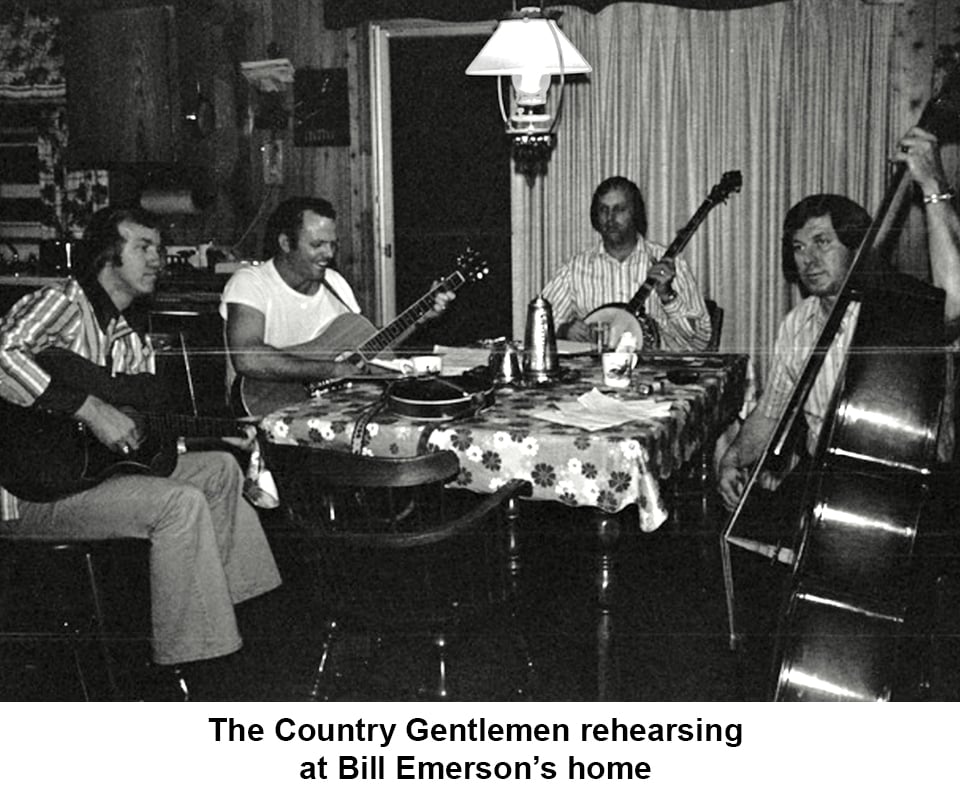
Laura further explained that when she was pregnant with Emerson, she could not stop watching the YouTube video of the Country Gentlemen, with Bill Emerson, Doyle Lawson, Charlie Waller, and Bill Yates perform “Matterhorn.” She said, ‘Most women crave food when they are pregnant. I craved that video. If there are one million views on that video on YouTube, half of them are mine.”
Laura runs Main Attraction Management and one of her clients at the time was Doyle Lawson. She said, “I had never met Bill Emerson, but I called Doyle and asked him about Bill. Doyle said that Bill was the nicest guy that you’d ever want to know.” That sealed it for Laura and Isaac. Their son’s name would be Emerson.”
Emerson Wade Mainer was born on October the 19th in 2018. About a year later when Laura heard that Bill Emerson was going to be inducted into the IBMA Hall of Fame, she and her husband made plans to travel to Raleigh so she could meet Bill Emerson and introduce him to his namesake. In the meantime, she had become friends with Billy Emerson on Facebook. Billy said, “I didn’t know her but somehow we became Facebook friends. She sent me a message and told me that they named their son after Dad, they would be in Raleigh and wanted to meet Dad and get a picture. I told Dad about it and he was thrilled. He was very touched by it.”
Another way that the good vibrations of Bill Emerson’s music lives on is in the home that he owned for thirty-one years (1967 to 1998). Billy Emerson now lives in his parent’s old house. Billy said, “I had been married about three years and was living in a condo and was looking to get a bigger place. Dad said, ‘I’m going to move and you can buy my house. I’ll give you a fair price.’ And he did. I moved into the house in 1998. Being in that house has a lot of meaning to me. I have a photograph on the wall of the Country Gentlemen rehearsing in the kitchen.”
Epilogue
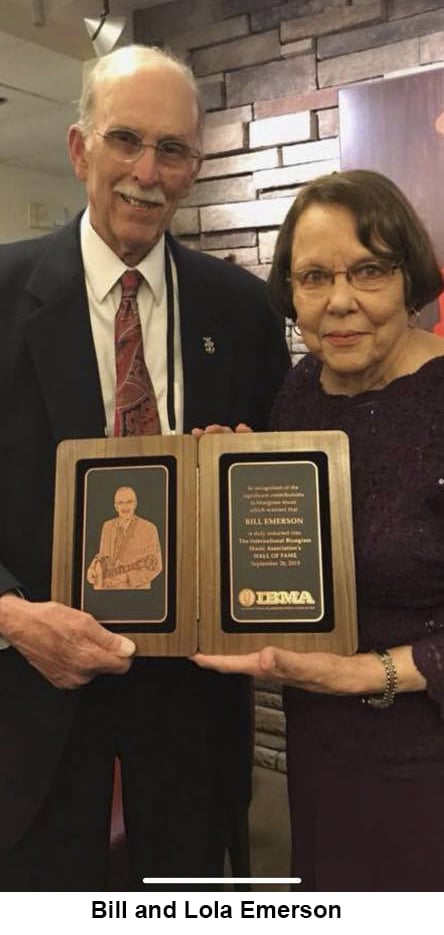
I never had the opportunity to meet Bill Emerson in person. He was always one of my favorite banjo players and having grown up in Northern Virginia, and also having spent time in the Navy, I always felt a connection to him and his music. Over my career I’ve written hundreds of magazine articles about musicians. When I got the job as editor of Bluegrass Unlimited Magazine, I thought to myself, ‘I’d like to write a whole book about someone someday.’ The first person that came to mind was Bill Emerson.
During July of 2021, I gave Bill a call and left a message on his machine. I was going to talk to him about the possibility of writing a book about him. I never heard back. About a month later he was gone. After he passed, I contacted his sons Mike and Billy and asked about writing this series of articles for the Bluegrass Unlimited website and they have both been very helpful. I’m hoping to continue to work with Mike and Billy so that this series of twelve articles can be expanded into a book.
Every week while I was working on this article series, Mike was going to his mother’s home and searching through his father’s belongings. Every week he would send me photographs of the treasures he would uncover. Incredible stuff! So, there is a lot more to say about the life of Bill Emerson and I hope that we can bring that to bluegrass fans in book form in the future.
While writing this series, I have interviewed a lot of musicians who knew Bill Emerson well. They have all have had nothing but good things to say about his banjo playing and musicianship. Each was inspired by him in some way. But, more importantly, they have all had wonderful things to say about Bill Emerson as a quality human being. The word that I heard repeated most often was that he was a true “gentleman.” Bill Emerson was one-of-a-kind “class act” individual and will continue to be greatly missed by his family, friends, fellow musicians, and fans.
Share this article
2 Comments
Leave a Comment Cancel Reply
This site uses Akismet to reduce spam. Learn how your comment data is processed.
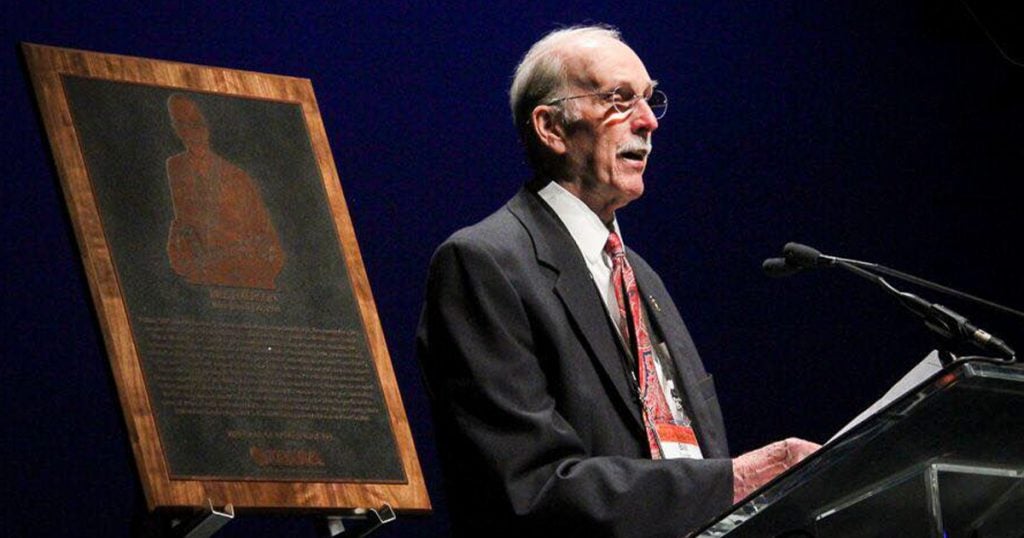
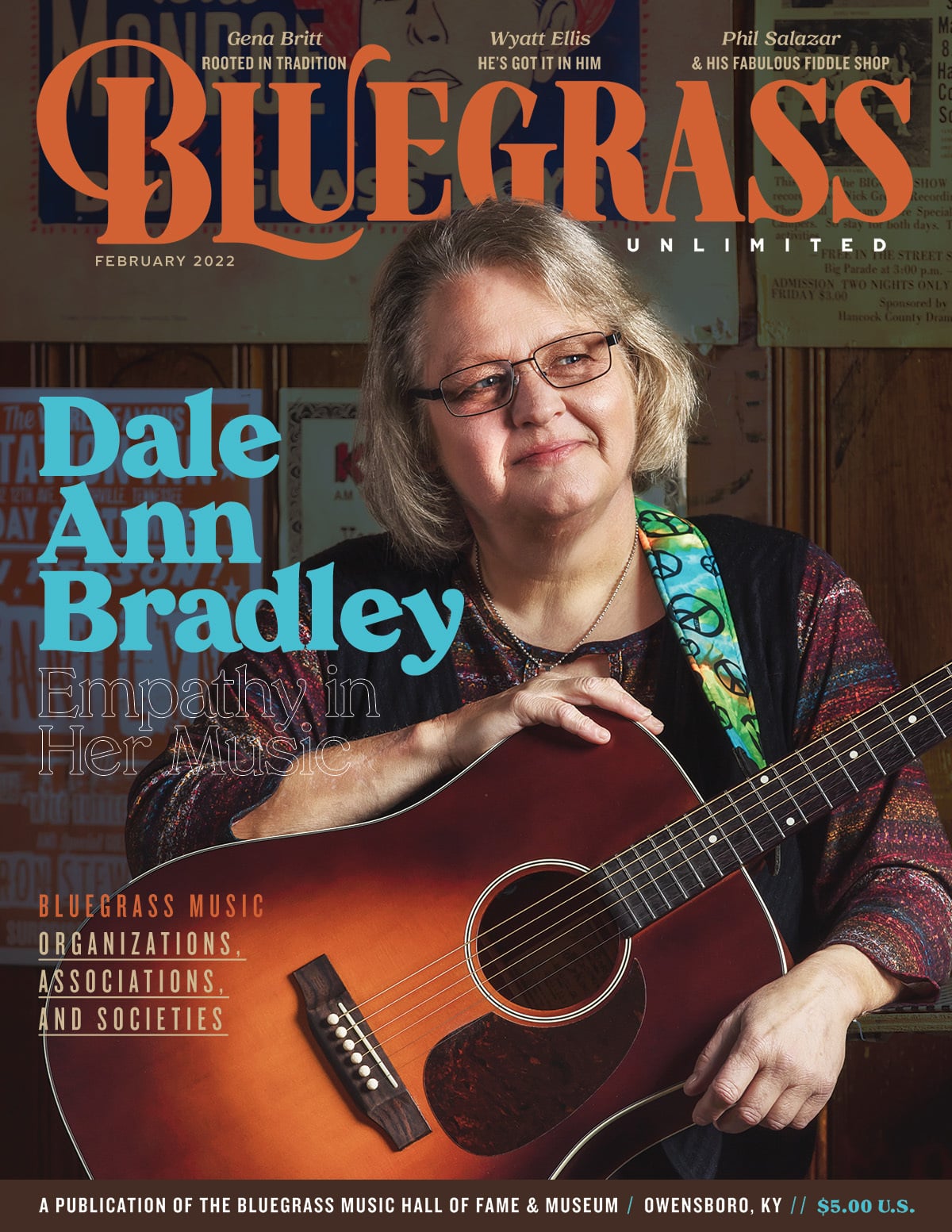
Hello Dan, Thank you so much contacting me and letting me share some of my experiences with one of my all time great heroes. Bill was a giant in the bluegrass world, and helped me learn and grow as a bluegrass picker.
You put together a great series of articles about Bill.
Thanks you,
Wayne Taylor
Dan:
You have done the Bluegrass world a great service in producing this series of articles on the late, great Bill Emerson. His sons, Mike and Billy have likewise given bluegrass followers a great insight to one of the true masters of the banjo and of this genre of music. His stellar career is so incredible to read about, and I, for one, have had the honor to call him my friend. Thank you for interviewing me to add to the story. It has been my honor and privilege to have been a small part of his story. Thank you, and the Emerson family for everything. I’m looking forward to your book. Sincerely, your friend,
Buster Sexton